- Home
- James Axler
End Day Page 10
End Day Read online
Page 10
Currant had no traffic citations. No wants or warrants in the United States or Canada. No prior arrests in either country. No New York state weapon permit, but a computer records check had turned up several occasions when she had legally purchased ammunition at a gun range in Connecticut—the total purchase amounted to nine boxes of .44 Magnum wadcutter rounds. When contacted by Manhattan police, the range owner remembered her and the weapon she’d had in her possession, because it had been a fancy semiauto Desert Eagle—and because it was a whole lot of gun for someone five foot five and 115 pounds. The range owner had been certain Currant had bought more ammo than she’d used on his targets.
Preliminary checks with the FBI and its Canadian counterpart, the Royal Canadian Mounted Police—RCMP—had revealed she had no connections to any known terrorist organizations. The Canadian Security Intelligence Service had nothing on her, either. She had worked for the same company for three years, paid her taxes and rent on time.
Hardly a usual suspect in a case like this.
Not that this case was in any way usual.
It got worse. Way worse.
Fingerprinting the metro turnstiles would have been a total waste of time had it not been for the Closed Circuit Television—CCTV—footage. When they zoomed in the video, they could approximate with some degree of certainty where the suspects’ fingers had touched the stainless-steel entry barriers. Of course, considering the number of hands that had also touched the turnstiles, pinpointing single sets of prints was still an incredible longshot.
But once again, things had fallen into place—sort of.
They had drawn blanks on six of the unknown suspects, but got a hit on the seventh, the black woman with the plaited hair. Three of the fingerprints on the turnstile belonged to a Dr. Mildred Wyeth, who had applied for and received a concealed-handgun permit. According to the permit application, she had competed on the U.S. national team and silver-medaled as a pistol shot.
Just when it looked as if they had their second suspect nailed down, the bottom dropped out. A further records check showed that Wyeth had nearly died on the operating table in December. An MD involved in cryogenic research, she was put into cryostasis and was flown to the Shelley Cryonic Institute in Minnesota. The woman in the metro video only vaguely resembled the driver’s license photo taken in 1998. She was black, yes, but her face was thinner and instead of an unruly Afro, she had beaded braids. On the CCTV she moved like a trained athlete or a battle-seasoned, elite soldier, not a deskbound academic.
But as everyone knew, fingerprints didn’t lie—no two sets were alike. The video showed the woman’s bare hand touching the steel in the exact spot where the fingerprints were lifted.
How was this possible? It just didn’t make sense. The timing was all wrong.
At every turn the case seemed to get more bizarre, and made to order for the tabloids. And the bestseller list. And the big screen. If he closed this one, he knew his story would be worth a fortune. He could even retire early, if he wanted to. But that was way down the road; many perplexing questions had to be answered first. Right now, his only concern was taking the next necessary step—successfully capturing at least one suspect alive.
His earbud crackled.
“This is Team Bravo,” the gravelly voice said. “We are in position for dynamic entry. Ready on your green.”
The time for reflection was over.
Nathaniel opened the channel on his com link. “Team Alpha, this is Command,” he said. “You have green light. Repeat, this is Command. Alpha you have green light. Take the shot.”
* * *
ESU SNIPER MATT CARTER knelt behind the raised lip at the edge of the rooftop. His balaclava pulled down over his face, he peered through the Remington M24’s Leupold Mk 4 LR/T M3 10×40 mm fixed-power scope. Thanks to the front bipod, the weight on his right shoulder was minimal. Downrange, behind the mil-dot wire reticle, the kill zone was a brightly lit, elongated rectangle in a facade of otherwise mostly darkened windows. Eight people were seated around a long table, eating from what looked like big bags of fast food. He could see them laughing as they stuffed their faces with both hands. They had no clue, didn’t realize they’d already been found. Clearly, they didn’t expect to be located so soon.
For some, if not all, it would be their last meal.
Finger resting outside the trigger guard, Carter put the crosshair wires on Snake Plissken’s chest. Bullet-drop compensation for the 150-yard distance to target had already been clicked into the Leupold. The zero was dead on. Because the rooftop gun was higher than the target, he used the vertical mil-dots to adjust his low hold. With the shot lined up, he focused on his breathing, slowing it until he could feel each beat of his heart.
Plissken would die first, as he appeared to be the gang leader. Cut off the head and all that.
Even for Manhattan, they were a strange-looking group. Survivalist-terrorist hippies or something. The long-haired albino was by far the freakiest of the bunch. He reminded Carter of a young Johnny Winter, the blues guitarist. The redheaded chick, on the other hand, was totally hot. He realized his concentration was slipping away and shut off the thought.
Ten feet down the roofline to his right, the shooting-team spotter, Joe Gaspers, had binocs on the kill zone. Fifteen feet to Carter’s left, Peter Balwan knelt behind a scoped Barrett M82. The semiauto .50 caliber weapon rested on its built-in bipod.
Usually when Team Alpha was called out, it was to bring down one, maybe two targets. In this case there were four times that many, and there was no way to drop them all. The initial problem was the heavily tempered and laminated glass that served as the building’s outside wall. Given distance to target, it was thick enough to stop and/or deflect the Remington’s 7.62 mm round, and cause a disastrous, first-shot miss.
The plan was for Balwan to break the glass between the 7.62 mm and the first target with the Barrett’s 660-grain slug, and then Carter would follow up a split second later with the kill shot slipped through the .50 caliber hole. The sniper team had practiced this sequence of precise shooting hundreds of times, until it was automatic and the separation timing between two dead-on shots less than half a second.
A further complicating factor was the fogging and spiderwebbing of the glass after a .50 caliber hit. It created a milky-white halo and fractures around the impact point, which would spread a good three feet in diameter and partially obscure the view into the room through that window panel.
After taking out the primary, they would move on to a predesignated sequence of targets, one through six. His bolt-action M24 held five rounds of M118 Match and one in the pipe. The semiauto Barrett’s box mag held ten. Once firing started, there would be no time for him to reload.
With exits at either end of the room, the targets could scatter both ways. Carter guessed he might hit three, if he was lucky and if they were slow getting up from the table. The short guy in the beat-up hat, the albino and the old guy had their backs to him and figured to be slowest to react. After the primary target was down, they would track aimed fire across the room from left to right, Balwan breaking glass for him with the .50 before he laid down each shot.
First the leader, Carter thought. He tapped outside the trigger guard with his fingertip. Bang! Riding the imaginary jolt of recoil, he smoothly swung the rifle’s sights, cycling the action in his mind, keeping his low hold, placing the mil-dot between shoulder blades of the guy in the hat, tapping the guard. Bang!
Back or front of target, it didn’t matter to him.
Dead was dead.
Carter had seen the highlights of the metro video as part of a very rushed mission briefing. Like everyone else in the room, they’d made him furious, but he wasn’t angry now. He never surrendered to any emotion when he was behind the gun. Hitting a moving target at distance was about control. Breathing. Heartbeat. Muscles. It required relaxation, then a precise application of finger pressure at a precise instant. Control was the only way to find and take advantage of t
hat perfect moment of calm.
When the command to commence fire came through his earpiece, despite his training and his experience, Carter felt a surge of adrenaline. There was no way to turn off that reaction to showtime.
“Confirm green light?” their spotter asked them both. This to make sure they had all heard and understood the order to apply lethal force.
“Confirm,” Balwan said.
“Confirm,” Carter repeated. He again slowed his breathing and slipped into a routine, a ritual that had become second nature. He snuggled into the buttstock, then dropped the rifle’s safety.
“Laser targeting on,” Gaspers said.
Carter flipped the switch at the same instant as Balwan. Laser beams shot across the yawning divide between the buildings, above the deserted Manhattan street. Red dots jostled over the same one-inch space on the outside of the heavy glass.
“On three...” Gaspers said, his binocs locked on the distant window.
As their spotter began the countdown, Carter added the backbeat, which was his timing cue. One-and, two-and...
On three the Barrett roared. Carter didn’t flinch; he hit the back beat with smooth finger pressure, and the Remington bucked into his shoulder.
The sound they created together was boom-bam! So tightly spaced it could almost have been a single shot and quick echo.
Downrange, the big pane of glass blasted inward. Four feet of its surface turned opaque in a crude circle. A puff of glass dust twinkled as it fell down the front of the building.
Working from the same rhythmic count, unspoken, from the same playbook, memorized, Carter and his partner rained down hell.
Boom-bam!
Boom-bam!
Chapter Twelve
Holding the fat sandwich, watching it drip juice in a puddle on the table, Ryan couldn’t help but remember the beefy cheesies from Shadow World’s Gloomtown—a sad, sick, toxic and eventually fatal joke on a starving-mad, expendable populace. Although similar in general shape, what he held in his hand was not powdered rock disguised as animal protein and perfumed with synthetic chemical aromatics. It was the real nukin’ deal.
The fabled double bacon cheese.
Something loudly and endlessly discussed over countless hellscape campfires while skinned Norway rats sizzled with sharp sticks jammed up their butts and skanky root veg roasted on open coals until their skins turned black. The predinner conversations always hit the same central themes, speculation more or less elaborate depending on the amount of joy juice the campers had swallowed.
“I heer’d they was four inches high and eight across’t.”
“I heer’d they weighed two pounds each.”
“I heer’d you could build ’em anyway you wanted, pickles, no pickles, extry grilled onions, fried egg on top.”
“I heer’d they came wrapped in special boxes like old-time birthday presents.”
The double bacon cheese was something Ryan Cawdor never thought he’d live to taste.
The first bite was so astonishing, he had to fight to keep from just wolfing down the whole thing. He chewed that bite slowly, eyes closed, savoring the blend of flavors and textures.
This was what the fuss was all about.
He swallowed, then picked up a strip of golden fried potato and bit it in two. It was hot, crispy on the outside, soft in the middle. A man could cry, it was so good.
On the other side of Vee, Mildred spit out a big mouthful of hamburger.
“Down!” she shouted. Then she rolled off her chair to the right.
There was no mistaking the nature of the situation. The six companions—Ryan, Krysty, Mildred, Doc, J.B. and Jak—had fought together so long, had survived so many surprise attacks that their responses were instinctive and instantaneous.
As Ryan twisted to his left, butt sliding off the chair, the ten-foot-tall, six-foot-wide pane of glass directly across the room from him shattered with a loud, crunching pop. Seemingly in the same instant, a heavy slug slapped the wall above him, and an inch from his right shoulder, the chair back took a center hit and rolled backward on its casters.
At the end of the table, the newest and least seasoned member of the team didn’t instantly react to Mildred’s warning. Jak lunged up from the floor, smashing Ricky with a shoulder, knocking him off his chair and onto the floor.
Ryan glimpsed the window, which was crazed, top to bottom. A single fist-size hole was in the middle of a wide, milk-white circle. One hole, two shots.
Longblaster fire. It was coming from the rooftop across the street, and they were sitting ducks.
To his left as he snatched his Steyr Scout by its sling, a second pane imploded, sending a whoosh of glittering glass shards across the floor. But he and the companions were already moving low and fast for the exit.
A third window collapsed, also to his left. The table shuddered as a bullet carved an ugly furrow across its width, spraying his head with splinters. Realizing the direction the shooters were team-tracking, he turned 180 degrees and grabbed Vee by the collar. As he dragged her the other way, she reached for the tabletop and grabbed her Desert Eagle and holster.
The shots that came after were wild, a big blaster and a smaller one, no longer coordinating fire. Tempered glass deflected the bullets. Working alone, neither shooter could put lead in the bull’s-eye. Mildred ran in front of them for the exit. She slapped the light switch on the way out, plunging the room into darkness.
Pushing Vee ahead of him, Ryan cleared the doorway and put the hallway wall between them and the longblasters.
Down the brightly lit corridor, the other companions leaned against the same wall. None of them appeared to have been hit. Head-size holes had been blown out of the wallboard by the big longblaster. White powder and bits of plaster decorated the magenta carpet.
“Who is shooting at us?” Vee asked. “Is it Magus?”
“Snipering at us is not really Steel Eyes’s style, my dear,” Doc said.
“Certainly not with enforcers playing on the team,” Mildred said. “It’s more likely the NYPD. They probably have been on to us for a while. The security guards downstairs were wearing sidearms. Rent-a-cops don’t usually come strapped like that. I should have put two and two together, but I didn’t think it was possible for them to locate us that fast. Got to figure by now they have the building completely surrounded and an all-out assault on this floor is imminent.”
After a quick breath she said, “Are we really going to kill police?” She seemed disturbed at the prospect.
“They don’t have a chance of getting past this weekend alive,” J.B. said. “But we do, if we can get back to Vee’s apartment in time to jump back to Deathlands.”
“If we let them take us now, we’re as doomed as they are,” Ryan told her. “We’ll be turned to dust along with everyone else, and Magus will win.” As always he was thinking like a natural-born Deathlander: sec men were sec men, no matter the uniform or the flag they fought under. Raise a blaster, pay the price. It was the survivalist code. The companions had every right to live, even if it meant someone else had to die.
The shooting had stopped for more than a minute. It was the lull before the storming.
The attackers didn’t want friendly-fire casualties.
They were coming; Ryan could feel it.
* * *
ESU LEADER Lieutenant Thomas Holmes stood with head lowered, eyes closed and his Glock 19 in his black-gloved fist as he got the report from Team Alpha’s spotter through his earbud. It was not what he wanted to hear. He listened with disbelief, then a flood of anger. “How could you have missed them all?” he said. “Goddammit, I should have taken the shot myself!”
He let his fingertip slide off the com link.
And the cherry on top: Team Bravo had waited on the emergency stairway landing for a couple of minutes to confirm the snipers had stood down.
He keyed his com link again and said, “Go, go! All units go!”
He was first through the fire door onto th
e floor, pistol supported in both hands. At the opposite end of the hall, the other fire door was just banging back. The elevator doors slid open, and the car disgorged more ESU officers.
Kneeling behind and bracing their riot shields on the floor, they created bulletproof cover for their comrades to leapfrog. Holmes stationed men at the three entry points to keep the perps from doubling back and using them to escape. From either end of the floor, ESU moved from door to door, room to room, closing in on the central point of the conference room. As they conducted their headlong search, there was no clatter of automatic gunfire, only shouts of “Clear! Clear!”
Minutes later the entire force met beside the hallway entrances to the conference room. It was wall-to-wall men in black. Holmes looked at the faces of those closest to him. Their eyes were wide with shock and anger—the trapped perps had seemingly gone up in smoke.
“Check this floor again. Start over,” he said. “Check the heating vents, the ceiling. Every goddamned inch. They’ve got to be here.”
Sweeping off his balaclava, he turned on the light in the conference room.
A cold breeze was flowing through the breached glass panels. There were numerous bullet holes in the wall, overturned chairs; the fast food left behind on the long table was still warm.
No blood.
No sign of them.
“Where the fuck did they go?” he said aloud.
Chapter Thirteen
Vee pushed from the wall and waved for the others to follow. “This way,” she said in a voice that she hoped left no doubt she knew exactly what to do. She took them across the corridor, through a doorway and into a small, well-appointed anteroom with a posh desk and chair, phone, computer, file cabinets—the domain of the publisher’s executive secretary. She quietly closed access to the hallway, then led them past the desk and through double floor-to-ceiling walnut doors that opened onto her boss’s luxurious office suite.

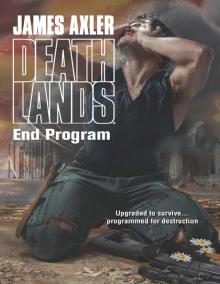 End Program
End Program Nemesis
Nemesis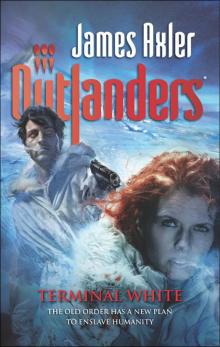 Terminal White
Terminal White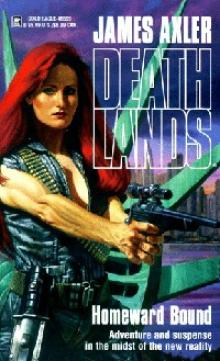 Homeward Bound d-5
Homeward Bound d-5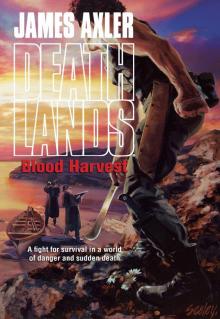 Blood Harvest (v5)
Blood Harvest (v5) Amazon Gate
Amazon Gate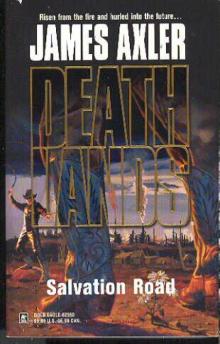 Salvation Road
Salvation Road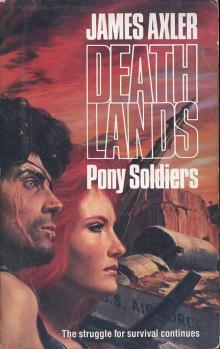 Pony Soldiers
Pony Soldiers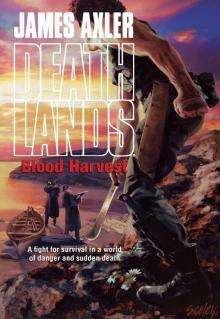 Blood Harvest
Blood Harvest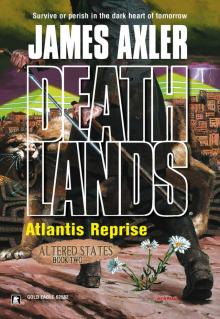 Atlantis Reprise
Atlantis Reprise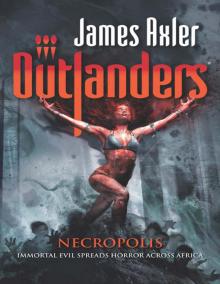 Necropolis
Necropolis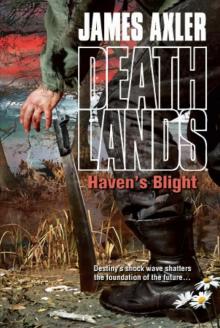 Haven's Blight
Haven's Blight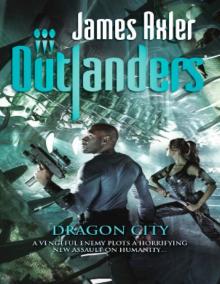 Dragon City
Dragon City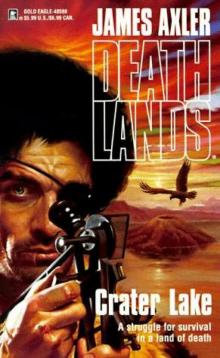 Crater Lake
Crater Lake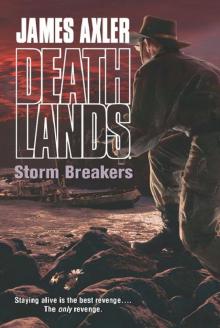 Storm Breakers
Storm Breakers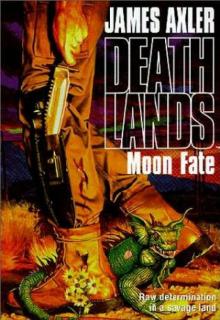 Moon Fate
Moon Fate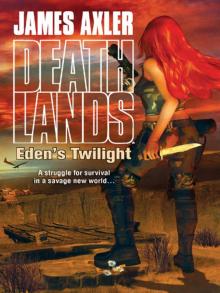 Eden’s Twilight
Eden’s Twilight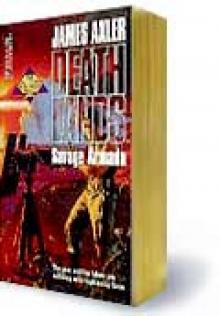 Savage Armada
Savage Armada Desolation Crossing
Desolation Crossing Time Nomads
Time Nomads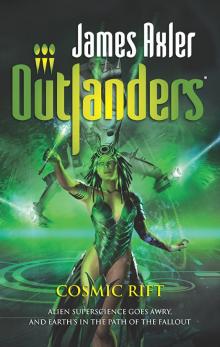 Cosmic Rift
Cosmic Rift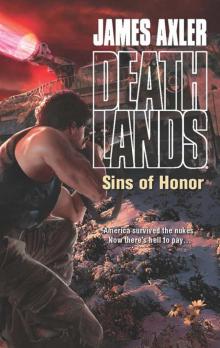 Sins of Honor
Sins of Honor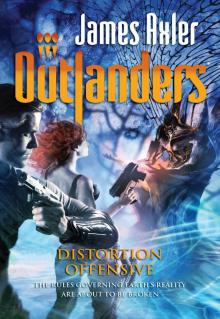 Distortion Offensive
Distortion Offensive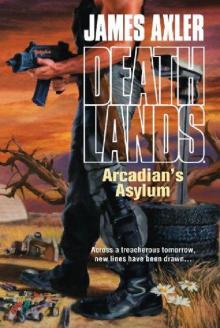 Arcadian's Asylum
Arcadian's Asylum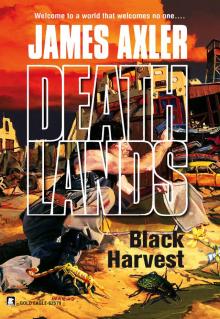 Black Harvest
Black Harvest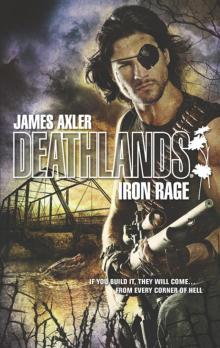 Iron Rage
Iron Rage Nightmare Passage
Nightmare Passage Labyrinth
Labyrinth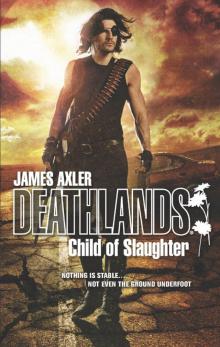 Child of Slaughter
Child of Slaughter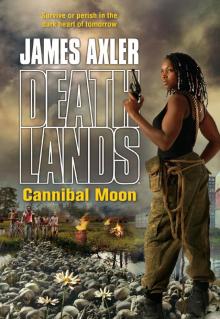 Cannibal Moon
Cannibal Moon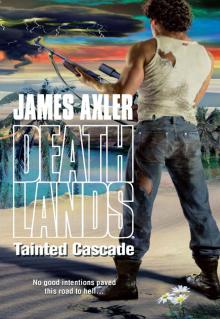 Tainted Cascade
Tainted Cascade Ritual Chill
Ritual Chill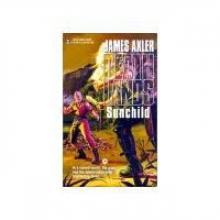 Sunchild
Sunchild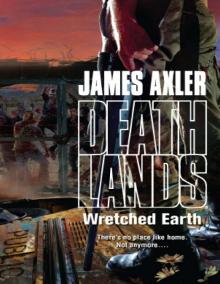 Wretched Earth
Wretched Earth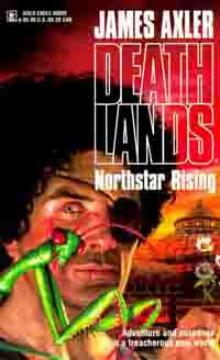 Northstar Rising d-10
Northstar Rising d-10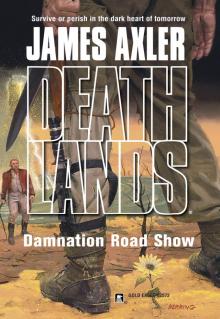 Damnation Road Show
Damnation Road Show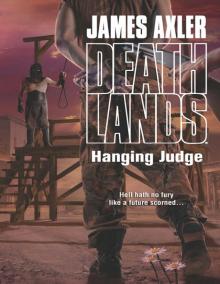 Hanging Judge
Hanging Judge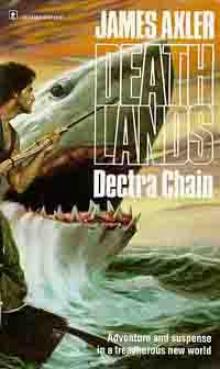 Dectra Chain d-7
Dectra Chain d-7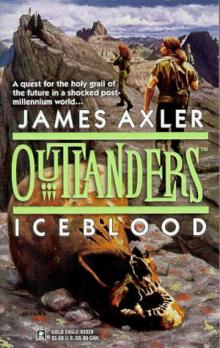 Iceblood
Iceblood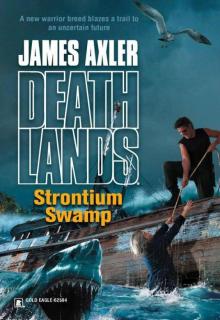 Deathlands 074: Strontium Swamp
Deathlands 074: Strontium Swamp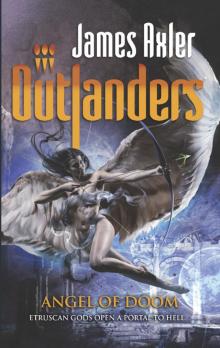 Angel of Doom
Angel of Doom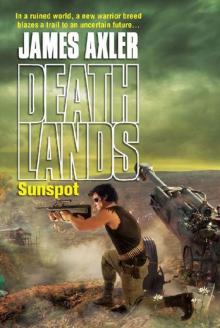 Sunspot
Sunspot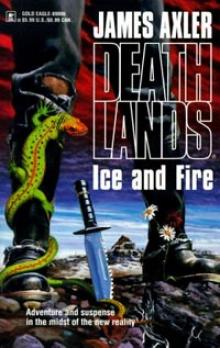 Ice and Fire d-8
Ice and Fire d-8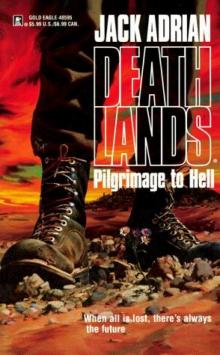 Pilgrimage to Hell d-1
Pilgrimage to Hell d-1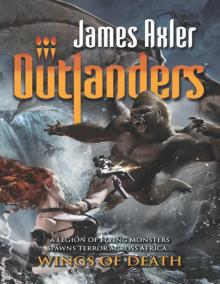 Wings of Death
Wings of Death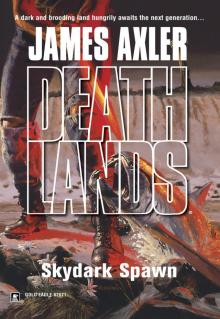 Skydark Spawn
Skydark Spawn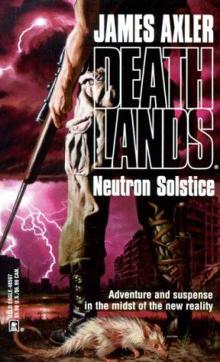 Neutron Solstice d-3
Neutron Solstice d-3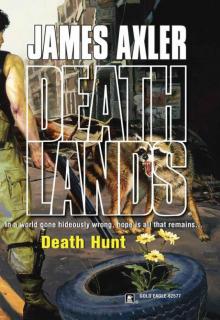 Deathlands 067: Death Hunt
Deathlands 067: Death Hunt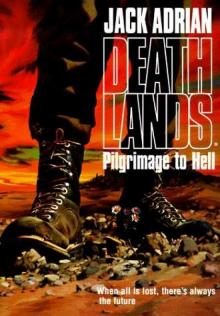 Pilgrimage to Hell
Pilgrimage to Hell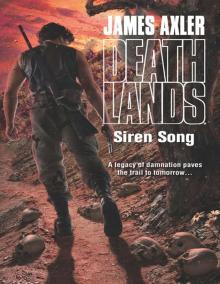 Siren Song
Siren Song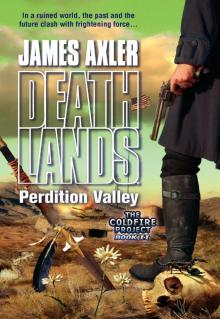 Perdition Valley
Perdition Valley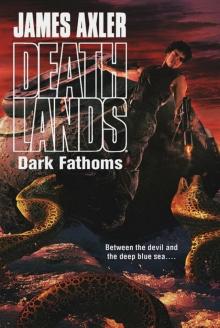 Dark Fathoms
Dark Fathoms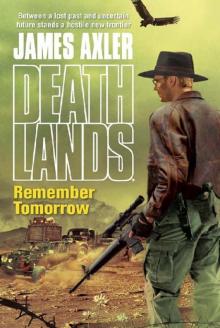 Remember Tomorrow
Remember Tomorrow Crucible of Time
Crucible of Time Savage Armada - Deathlands 53
Savage Armada - Deathlands 53 Judas Strike - Deathlands 54
Judas Strike - Deathlands 54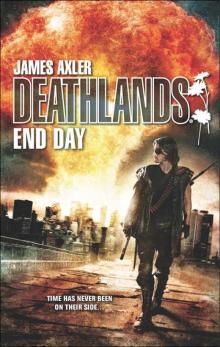 End Day
End Day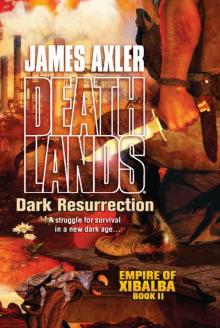 Dark Resurrection
Dark Resurrection Deathlands - The Twilight Children
Deathlands - The Twilight Children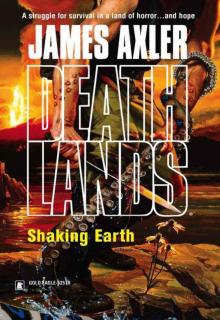 Deathlands 068: Shaking Earth
Deathlands 068: Shaking Earth Breakthrough
Breakthrough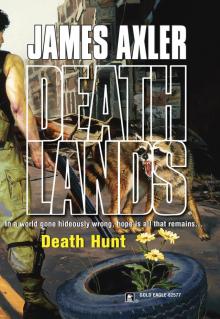 Death Hunt
Death Hunt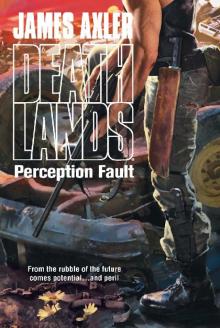 Perception Fault
Perception Fault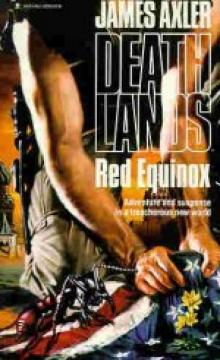 Red Equinox
Red Equinox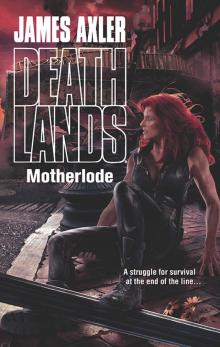 Motherlode
Motherlode Deathlands 071: Ritual Chill
Deathlands 071: Ritual Chill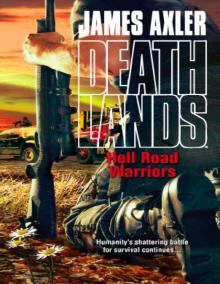 Hell Road Warriors
Hell Road Warriors Downrigger Drift
Downrigger Drift Gaia's Demise
Gaia's Demise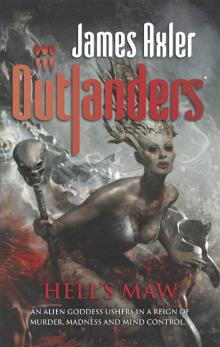 Hell's Maw
Hell's Maw Devil's Vortex
Devil's Vortex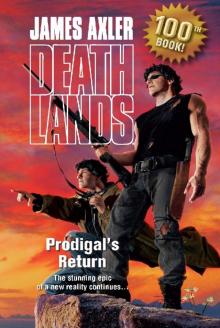 Prodigal's Return
Prodigal's Return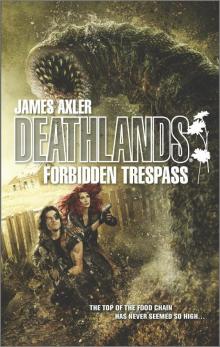 Deathlands 122: Forbidden Trespass
Deathlands 122: Forbidden Trespass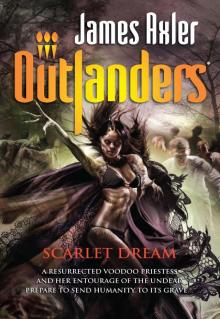 Scarlet Dream
Scarlet Dream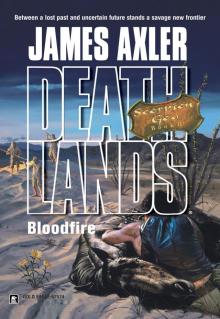 Bloodfire
Bloodfire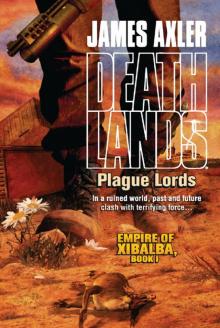 Plague Lords (Empire of Xibalba, #1)
Plague Lords (Empire of Xibalba, #1)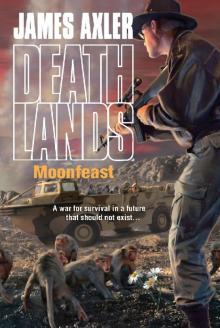 Moonfeast
Moonfeast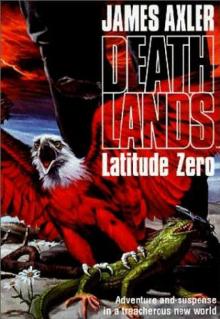 Latitude Zero
Latitude Zero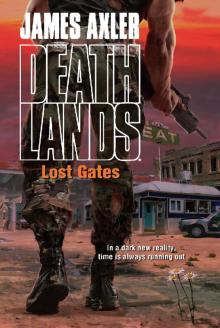 Lost Gates
Lost Gates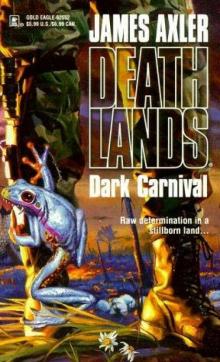 Dark Carnival
Dark Carnival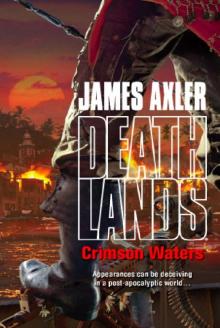 Crimson Waters
Crimson Waters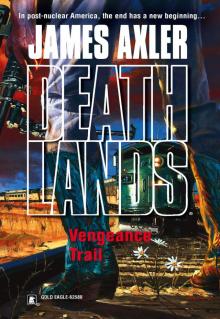 Vengeance Trail
Vengeance Trail Apocalypse Unborn
Apocalypse Unborn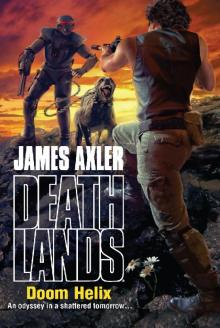 Doom Helix
Doom Helix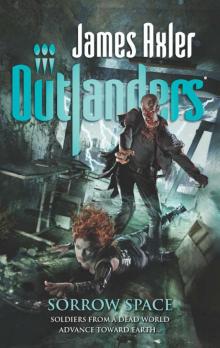 Sorrow Space
Sorrow Space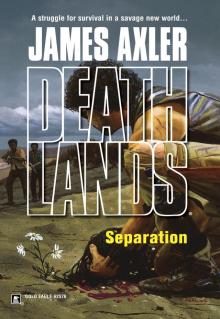 Separation
Separation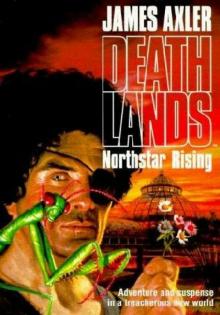 Northstar Rising
Northstar Rising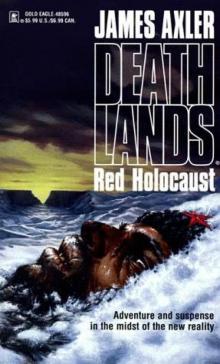 Red Holocaust
Red Holocaust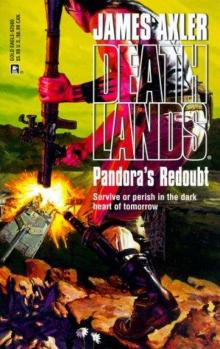 Pandora's Redoubt
Pandora's Redoubt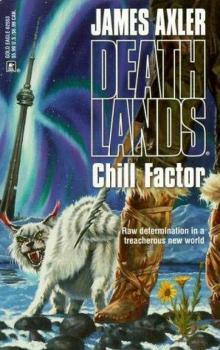 Chill Factor
Chill Factor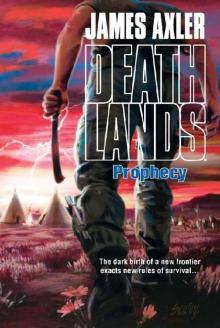 Prophecy
Prophecy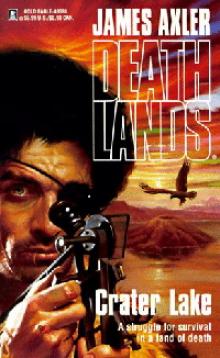 Crater Lake d-4
Crater Lake d-4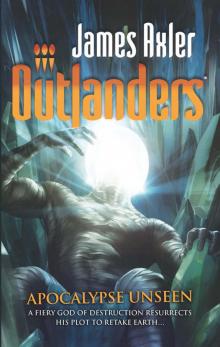 Apocalypse Unseen
Apocalypse Unseen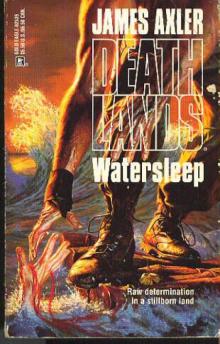 Watersleep
Watersleep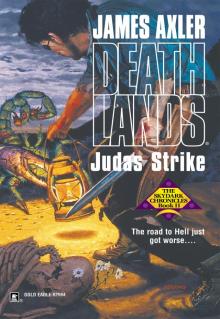 Judas Strike
Judas Strike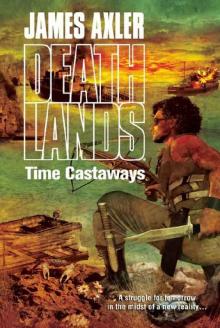 Time Castaways
Time Castaways Baptism of Rage
Baptism of Rage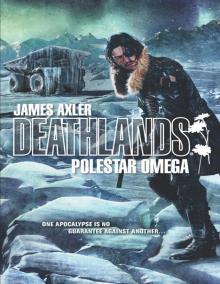 Polestar Omega
Polestar Omega Red Holocaust d-2
Red Holocaust d-2 Outlanders 15 - Doom Dynasty
Outlanders 15 - Doom Dynasty Way of the Wolf
Way of the Wolf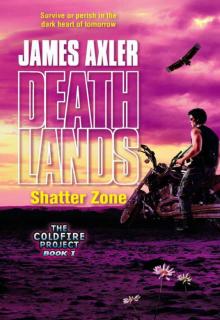 Deathlands 075: Shatter Zone
Deathlands 075: Shatter Zone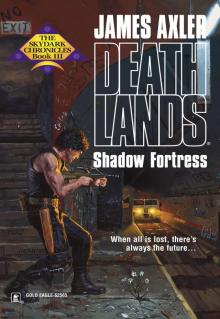 Shadow Fortress
Shadow Fortress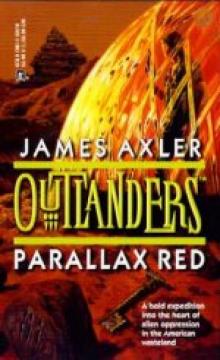 Outlander 05 - Parallax Red
Outlander 05 - Parallax Red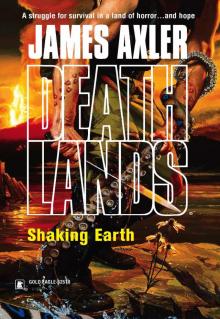 Shaking Earth
Shaking Earth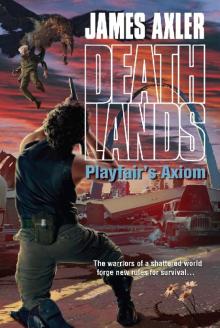 Playfair's Axiom
Playfair's Axiom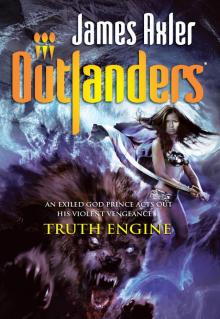 Truth Engine
Truth Engine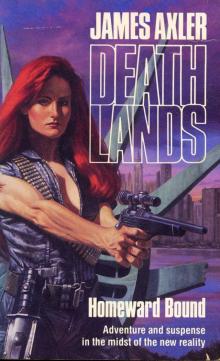 Homeward Bound
Homeward Bound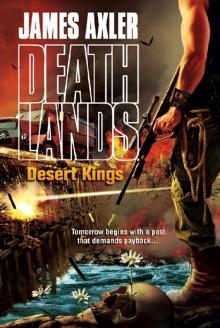 Desert Kings
Desert Kings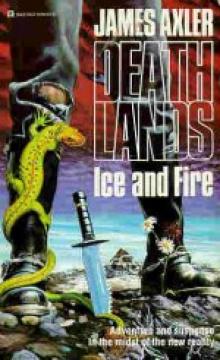 Ice and Fire
Ice and Fire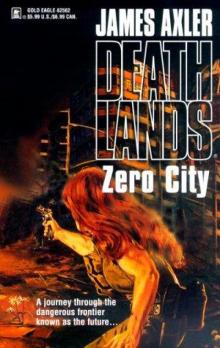 Zero City
Zero City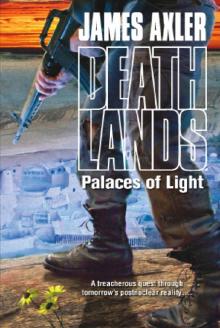 Palaces of Light
Palaces of Light No Man's Land
No Man's Land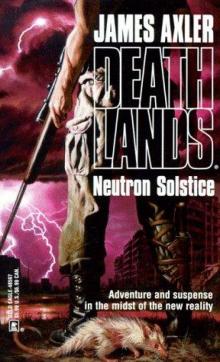 Neutron Solstice
Neutron Solstice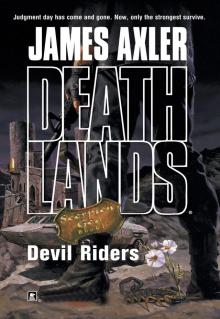 Devil Riders
Devil Riders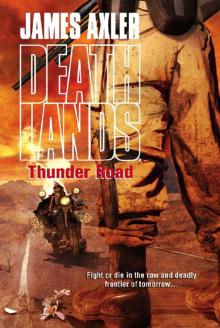 Thunder Road
Thunder Road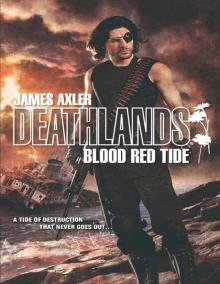 Deathlands 118: Blood Red Tide
Deathlands 118: Blood Red Tide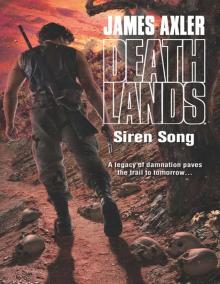 Deathlands 114: Siren Song
Deathlands 114: Siren Song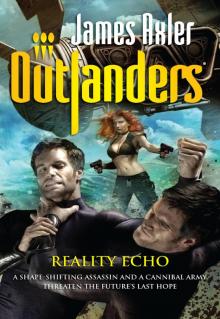 Reality Echo
Reality Echo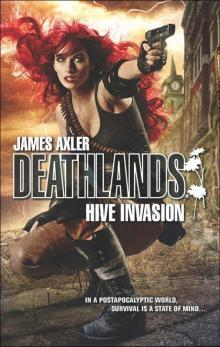 Hive Invasion
Hive Invasion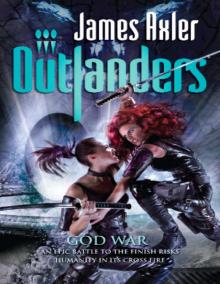 God War
God War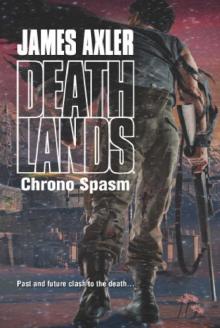 Chrono Spasm
Chrono Spasm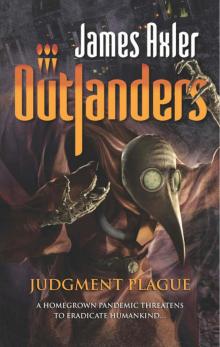 Judgment Plague
Judgment Plague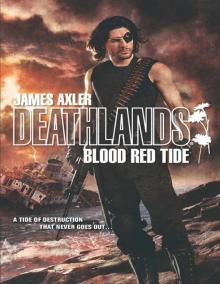 Blood Red Tide
Blood Red Tide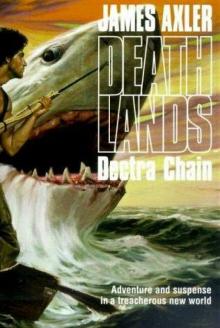 Dectra Chain
Dectra Chain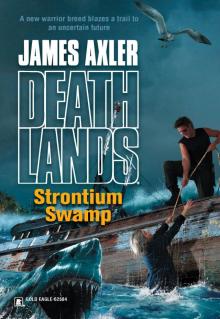 Strontium Swamp
Strontium Swamp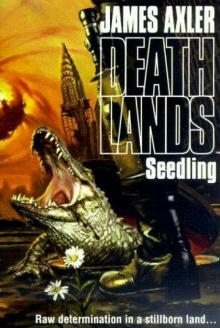 Seedling
Seedling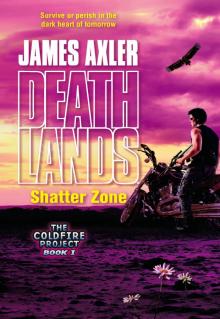 Shatter Zone
Shatter Zone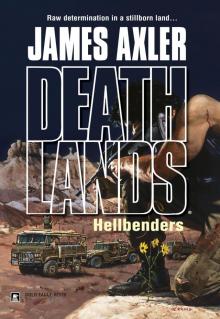 Hellbenders
Hellbenders